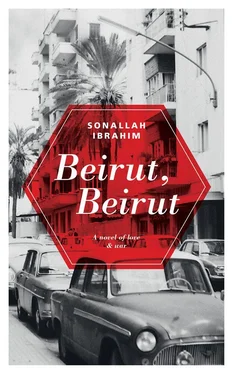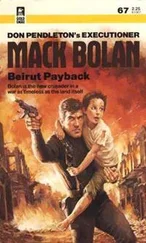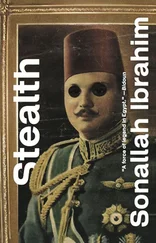An abandoned street in Beirut. Trash and barrels everywhere. Padlocks smashed and thrown down in front of closed-up bars. An open door to a house. Inside are empty, plundered rooms. A thief carrying an electric chandelier runs down the street, chased by members of the Palestinian Armed Struggle forces.
Fires blaze at the Rivoli Cinema.
The presidential palace in Damascus. Rashid Karami ascends the stairs.
Part of a meeting in Beirut: Zuheir Mohsen — leader of the Palestinian al-Sa’iqa organization that is loyal to Syria — wearing a colorful silk shirt and white pants, holds in his hand a deluxe narghile; Abu al-Hasan, Fatah’s security official; Yasser Abed Rabbo, one of the leaders of the Democratic Front for the Liberation of Palestine; Colonel Antoine Dahdah, Lebanon’s security chief.
Title card:
Ceasefire agreement, but Phalangists have caused the situation in Zahlé to explode.
Beirut. Martyrs’ Square. The rubble of the al-Arabi Hotel with a human leg visible in it. A man lying face-down in the entranceway of a bar; in its glass façade boxes of toilet paper can be seen. Blood stains the man’s back.
A blindfolded man is walking between two gunmen.
Headlines of Lebanese newspapers: “307 kidnapped and 200 released. 21 bodies found.” “Extremist Palestinian group attacks Beirut Airport. 3 killed. Leadership of the resistance movement disavows the attack and the Palestinian officials hand over one of the attackers.”
Trucks carrying armed men leave a village and set off on the back-country road. They pass a village and open fire on its homes.
Beirut. An empty street. An old man with no teeth in a full suit is walking with a bag clutched to his chest. A sniper’s bullet hits him in the leg and he falls to the ground. He lifts his head and looks around him, then crawls, calling for help, without letting go of the bag. A man protected by the doorway of a neighboring house ties a rope into a lasso and tosses it to the old man without daring to stick his head out of the doorway. He pulls the old man with the rope far out of the sniper’s range. The bag falls from the old man’s hand and loaves of bread roll out of it.
Fire blazes in the old Souq Sursock. The destruction extends to the Vegetable Souq, the Opera House Souq and the Goldsmiths’ Souq. Women and children in cheap, colorful clothes dig through the piled rubble of souqs and shops. Some armed men join them in the digging. Young men carry piles of clothes and wrapped bundles. Others spread out different items for sale on the sidewalks of Hamra and Raouché.
A house in the Barjawi neighborhood with its walls pierced by shells. The ruins of the Asseily Textile Factory in Chiyah. A Mercedes with its rear end transformed into a deep concavity because of a bomb. Another wrecked car that a gunman climbed onto in order to jump through the window of a grand home. The rubble of a house. The blackened frames of beds, clothes hangers and chairs.
A car speeding over Fu’ad Shihab Bridge, heading toward the Christian district of Achrafieh. A sniper’s bullet hits the driver: he smashes into the bridge’s barrier and the car juts out over the water.
People surround a dazed woman whose head is covered with a handkerchief. Right beside her is a dead man flat on the ground.
A Mercedes. Its driver is busy tying the suitcases of its passengers to the roof. A family of two women, a man and two children are carrying suitcases and walking on a dust-covered street.
The façade of a demolished building, the ground floor of which is a large, closed store carrying the sign “Installation of All Kinds of Glass and Crystal”. A room inside the building with its walls pulverized by rockets. A child’s head in the middle of the rubble.
A newspaper headline: “Jumblatt announces that Phalangists alone spend 1 million lira a day for military call-up. Their lowest-paid fighters get 500 to 900 lira, a barricades squadron chief gets 2,000, and a neighborhood commander gets 3,000, in addition to the wages of French mercenaries and their insurance costs.”
Yasser Arafat in military clothes puts his hand on Camille Chamoun’s arm and smiles with affection. Chamoun is frowning.
Main headline in a Lebanese newspaper: “Agreement to remove barricades and gunmen in battle zones in the capital.”
Title card:
Beirut. Martyrs’ Square. Four days later…
A 21mm mortar gun shoots out flame. Fire and smoke. People hurry to the shelters. Women in nightgowns and barefoot men.
A headline in al-Safeer : “Phalangists and Tigers pound the Lazaria district; central Beirut burns.”
The Beirut skyline at night. The rockets flying into the air between neighborhoods light it up.
The radio: “Most Beirut streets are unsafe.”
A long commercial street in West Beirut. The shops are closed. No trace of a human being. The residential apartments over the shops seem abandoned by their inhabitants. Sandbag barriers on both sides of the street. Shells are launched back and forth between the two sides. A white flag is raised above each barrier and the killing comes to a halt. A gunman walks forward from each side carrying the white flag. The two meet in the middle of the street. They have a brief discussion, then a number of their colleagues join them. They split up into groups of two, one from each side, and proceed to break into the shops on both sides of the street. Gunmen move the contents of the shops outside. Clothes, shoes, electrical appliances and food are gathered into a big pile in the middle of the street. The plundered goods are divvied up between the two sides. Men from each side carry their share to their positions. The fighting resumes.
The aristocratic Christian neighborhood of al-Kantari Street burns. Smoke covers Beirut’s sky. Flames consume the Austrian Myrtom House restaurant. An Alfa Romeo burns in the middle of the street. Flames consume an old Ottoman-style building. Men and women push each other in the doorways of houses, coming and going, as they carry suitcases and bundles, tossing them into trucks and cars.
The staircase of a luxury building. Gunmen are carrying out Persian carpets. The entrance of a residence: its expensive furniture appears to be smashed into little pieces.
Title card:
On October 26, the Council of Ministers settled on a ceasefire agreement.
Range Rovers painted black carry about twenty masked gunmen from the Tiger militia loyal to Chamoun, the interior minister. The cars stop in front of the St George Hotel. The gunmen begin unloading boxes of weapons and ammunition. Inside the hotel the employees begin gathering up the carpets.
Title card:
On October 29, a new ceasefire agreement was reached, guaranteed by both the president and prime minister.
Black paramilitary cars blast their sirens as they go. Phalangist gunmen in black hats and outfits jump out of them, carrying machineguns. One of them runs from one corner to another with a pair of binoculars swinging on his chest. The gunmen shout at passersby, then start firing in every direction.
Title card:
On November 1, a new ceasefire agreement was reached. The Phalangists and Tigers broke it three minutes later.
Two days later, representatives of the parties and factions fighting each other met again and agreed to put an end to displays of arms and to return all hostages.
The next day…
Main newspaper headline: “Shifting barricades kill more than 50 citizens because of their identity. Dozens of bodies discovered. 2 bombs tossed from a car at the headquarters of the Social Nationalist Party.”
Main headline of another newspaper: “The nationalist movement and the Palestinian resistance accuse the Deuxième Bureau of working to violate every truce by undertaking terrorist acts against all parties.”
Читать дальше












